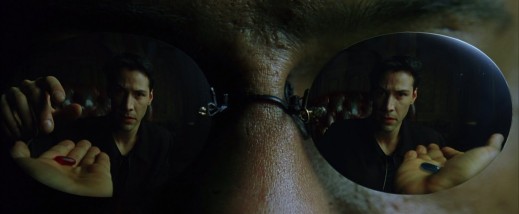Facticity
I don’t miss the way things used to be. I don’t revel in the way they are now. I don’t expect a perfect future. Things have to be the way they are, and even our possibilities are delineated before our volition, before our choosing actions. I’m just disappointed in the order of things.
What exists?

You drive. You zone out. You reach your destination without incident.
You attend a party and socialize. You are not present. Your mind was on something else. Your’e a big hit! Read More…
The Future of Gaming must be Virtual Reality

Transhumanism. A movement whose philosophical basis lies in a repudiation of the human as a limited being. Homo sapiens must move forward. But where should, or will, we go? Read More…
SAO and Virtual Reality

The hype over the popular Japanese anime series “Sword Art Online,” or SAO, has finally gotten to me. Monday I was visiting a friend’s new apartment. There was little to do other than watch netflix and I had little time before I needed to head back home, so… we checked the anime section. Read More…
Dogmatism
Belief and country: two things to which unconditional love should not extend.
Lacan at the Movies

German director Wim Wender’s 1987, “Wings of Desire,” ranks as one of a few contemporary films assigned indefinitely to the pantheon of cinema classics. With its even, sombre, but reflective tone, and mise-en-scene of bleak optimism and vain hope, the film should strike a chord with those thinkers who register little real change behind apparent shifts in social formations. (I’m thinking of Giorgio Agamben in particular, whose philosophy ascertains the inherent similarity between the totalitarian and actually-existing forms of democratic republics).
It is then-contemporary Berlin. An angel (Bruno Ganz), perched atop the Brandenburg Gate, gazes joyfully at the world below. People move. They eat, they drink, they fornicate. They experience pain, pleasure, anger, peace. They live, and they desire to live longer, to live better, to become other than they are.
The city’s two guardians angels can be anywhere at any time. Omnipresent. They know all there is to know. Omniscient. They try their hardest to influence the lives of the downtrodden and jaded for the better. Often they succeed, and sometimes they fail. They cannot feel the weight of their clothes, the taste of food, the chill and cold air, the pain of being a temporal being. One (Ganz) tires of forever, of all, of everything. He is directed toward a woman who herself dreams toward angelic existence.
a. The objet petit a. The object/cause of desire. We move toward both tangible and intangible goods. We desire these things, these object/causes of desire, because we are drawn by them. There is a lack within each being. For Wenders, this lack is not only an affair of the human condition, but of the very condition of existence itself. To desire nothing is stagnation, and certainly, process is a feature of perfection.
But we not only desire, we are (like those pained existents in Wender’s film) condemned to desire. For when we attain the object of desire, the objet petit a, it is no longer the object. Desire is a constant force. This is why Wender’s film is so tragic. The angel will not remain satisfied with his object forever. The trapezist will not remain enamored with him either.
Thinking

An assemblage. A body without organs. Moving as they and it do together.
The hands that grasp are grasped themselves.
Thinking, it directs the limbs. Moving, it registers movement. Standing, it thinks nothing of the viscera of that position; of the contortions of each muscle. It stands, and the existent fades.
Ensouled, enraptured, enveloped. No. Embodied, instantiated! Wrong again. Neither? No. Both? Not quite.
All this bio-metaphysics, this dialectical undertaking, this moving toward that which shrinks away upon approach. The pride of Icarus. The death of many.
But what to do? Remain as such? Move for nothing, toward nothing! It is, likewise, untenable.
There are no trodden paths. Its all been done. My thoughts escape me. I’m going to sleep.
Book 9

“As I lay dying the woman with the dog’s eyes would not close my eyes for me as I lay in Hades.”
~The Odyssey
Govinda

“No longer knowing whether time existed, whether this seeing had lasted a second or a century, no longer knowing whether a Siddhartha existed, or a Gautama, or I and Thou, wounded in his innermost as if by a godly arrow, whose wounding tasted sweet, enchanted and dissolved in his innermost, Govinda stood for a brief while, leaning over Siddhartha’s face, which he had just kissed, which had just been the setting of all formations, all Becoming, all Being.”
~Herman Hesse’s “Siddhartha”
A Call to Action from the Void

“Let us not waste our time in idle discourse! Let us do something, while we have the chance! It is not every day that we are needed…. To all mankind they were addressed, those cries for help still ringing in our ears! But at this place, at this moment of time, all mankind is us, whether we like it or not”
Vladimir addresses his words in Samuel Beckett’s tragicomic play, “Waiting for Godot,” to a traumatized, post-war Europe. The zeitgeist of which recognized the futility of peace. Fascists destroy, and we destroy fascists: there is no other tenable response. The powerful existents challenge a constructed moral order to enact their will to power, as moralists and altruists protect the weak through displays of power themselves.
When you think you’ve reached the end of conflict, that primordial beast whips back and latches to its tail. No forward, no back, it spirals. Ouroboros. That’s war hun’.
Am I wrong? Do tell.

You must be logged in to post a comment.